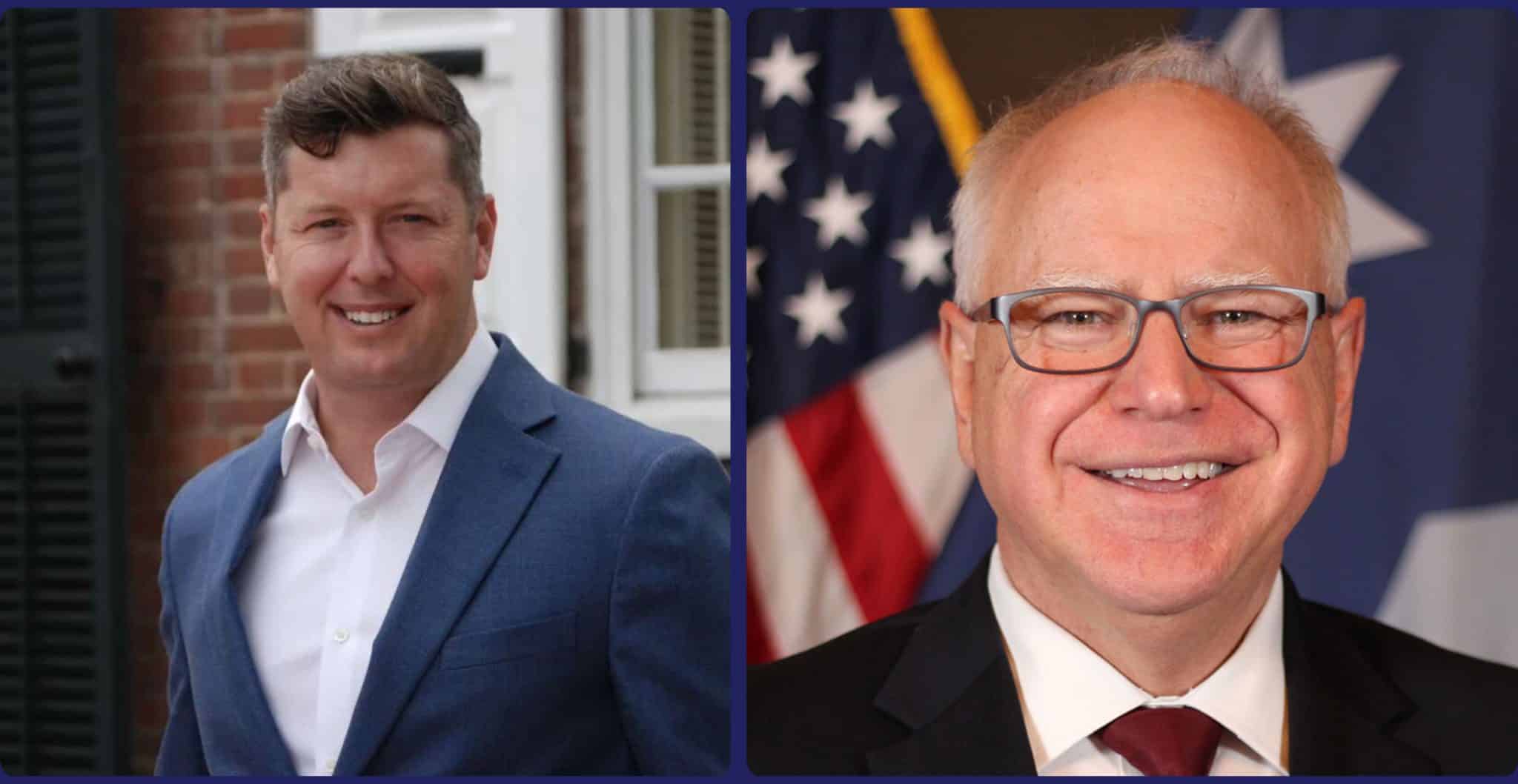Former U.S. Congressman Patrick Murphy – who represented Bucks County from 2007-2011 – is in high demand on news programs these days. Not just for the things he’s done, and continues to do, but for who he’s done them with. “Tim Walz and I both won for the first time in 2006. We both represented districts that republicans represented before us.”
And now, Murphy is back on the stump, working to get his friend elected to the second highest office in the land. When he heard that Walz was on the Harris ticket he leapt into action. “I texted him right away. Whatever you need – I’m there for you, brother.”
As a direct result of years of working – and living – with the governor, Murphy feels compelled to prioritize a Harris/Walz win. “He’s one of those natural leaders that you’d run through a wall for – a barrel-chested American soldier that always does the right thing.”
When Murphy and Walz met at the congressional orientation for incoming freshmen, they hit it off immediately. After comparing finances, the two former military men went looking for a place to live. “We were two of the poorest members of Congress. Tim Walz was my roommate.”
Murphy and Walz reflect different images of the same quintessential American success story. Walz, a 17-year-old whose dad escorted him to the recruitment office so he could enlist in the national guard and Murphy, a student at Bucks County Community College when he joined the ROTC, both used military scholarships to educate themselves.
And now, the two lead extraordinary lives. One, a sitting governor who is also running for vice president. The other, a former undersecretary of the Army, educator at West Point who turned Venture Capitalist, and lectures at the Wharton Business School.
Murphy knows that their military experiences, as well as their humble middle class backgrounds, made it easier for them to craft legislation together. He and Walz had a common goal – to make life better for ordinary Americans – especially soldiers like themselves.
In the House of Representatives, the two men stood out for the firsts they’d already accomplished. Walz was the highest-ranking non-commissioned officer to serve in the U.S. Congress, and Murphy was the first Iraq War veteran elected to the House of Representatives. But, it was their humble origins that made them the men they are today.
Murphy explained, “My dad was a Philly cop, and I grew up in Northeast Philly. We had that row house mentality. We cared about who was on our left and our right.” Much like Walz with his oft repeated rejoinder, “Growing up, I learned to be generous toward my neighbors, compromise without compromising my values, and to work for the common good.”
Or as Murphy’s mom put it, “Do what’s right even when no one is looking.”
One of the issues the two junior congressmen agreed had to be addressed was the Bill Clinton era Department of Defense Directive 1304.26, referred to as ‘Don’t Ask, Don’t Tell‘ (DADT). Murphy – a combat veteran and former JAG officer – mourned the destroyed careers and diminished military the DADT policy caused. “The DOD [Department of Defense] kicked out 13,000 [military personnel]. Two or three a day! Kicked out people because of who they loved. It was atrocious.”
In fact, in a recent speech to the Human Rights Campaign Dinner, Tim Walz recalled working with Bucks County Congressman Patrick Murphy to end the militarily unwise practice.
Chris Hart, retired colonel and current Course Director for the Army Strategic Education Program at the U.S. Army War College in Carlisle, PA, echoes Murphy’s regret over the way the military punished gay and lesbian members of the military who refused to be closeted.
During one of his many tours of duty, Hart served as president – think presiding officer – of a military trial in the early 2000s. “It was a three-person panel. Two command Sergeant Majors and me… I was a Major. We court-martialed a soldier for being openly gay. It was so crazy. I felt so horrible about it. We were in Iraq. She was carrying on a relationship and she was in flagrante delecto.” That’s a Latin term best defined as caught red handed.
Hart continued with a heavy sigh, “’Don’t Ask, Don’t Tell’ was really unfortunate. She was thrown out of the military with an other than honorable discharge. That can ruin a career.”
Fast forward to September 20, 2010, Murphy recalls that the bill he worked for, the ‘Don’t Ask, Don’t Tell’ Repeal Act, had bipartisan support and very little push back. “Congress never even had a hearing on it. The law passed quickly.”
But then, a tea-party wave crashed down on a number of the law-makers who supported it, costing people their seats – Murphy included – and perhaps signaling anti-LGBTQIA+ sentiment that seems to be fueling the Trump/Vance ticket.
READ: It’s Not Easy Being an LGTBQ+ Worker in the United States
Even though the Supreme Court of the United States appeared to have legitimized LGBTQIA+ existence in 2015 with their landmark Obergefell v. Hodges case that extended marriage equality, just two years later – in 2017 – then President Trump banned transgender troops from the military. Challenges to the policy delayed the restrictions, but in April 2019, he got his way.
Not until a reversal put in place by the Biden administration, were transgender military personnel allowed freedom of expression and access to gender affirming healthcare.
Murphy and Hart, two men who don’t know each other but served under what they agree was an unjust rule, voiced concern that Trump returning to the White House will likely upend the rights of LGBTQIA+ military personnel.
When Hart was asked if Trump would turn back the clock, go back to DADT or worse, he responded, “Personally, I think former President Trump is just a vessel. For all his bluster, he’s not curious. Some say he’s one of the most incurious people. Doesn’t read briefings. In that way, I wouldn’t put anything past Mr. Trump.” After a moment, the retired colonel added, “Yeah, I think he could roll back the clock. I think I’ve felt that way since they invalidated Roe v. Wade.”
Murphy – as a surrogate for the Walz campaign – has no doubt.
“My job is reminding people that Trump put us eight trillion dollars in debt with his tax breaks for the ultra-wealthy. He says one thing and does the other. He dishonors my brother and sister veterans by calling them suckers and losers. Five police officers eventually died because of January 6th.” As for DADT and other regressive Trump/Vance proposals via 2025, “We cannot go back to failed policies that hurt families.”
In response to inquiries from the Bucks County Beacon, Democratic National Committee Spokesperson, Addy Toevs concurred, “As President, Donald Trump… took the military back decades by banning transgender Americans from serving. Trump’s history of putting down veterans and military families isn’t befitting of a Commander in Chief. ”
Toevs continued with a directed message to the district that originally sent Patrick Murphy to the U.S. Congress, “In November, Pennsylvanians will have the chance to vote for a Harris-Walz ticket, two tireless advocates for Americans in uniform – no matter how they identify – who stand ready to chart a new way forward that focuses on strengthening our democracy, lowering costs, protecting reproductive freedom, and honoring our service members and their families.”







